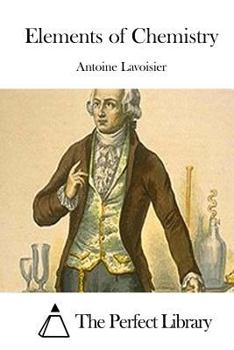Elements of Chemistry
Select Format
Select Condition 
Book Overview
The debt of modern chemistry to Antoine Lavoisier (1743-1794) is incalculable. With Lavoisier's discoveries of the compositions of air and water (he gave the world the term 'oxygen') and his analysis... This description may be from another edition of this product.
Format:Paperback
Language:English
ISBN:1512007048
ISBN13:9781512007046
Release Date:May 2015
Publisher:Createspace Independent Publishing Platform
Length:316 Pages
Weight:0.93 lbs.
Dimensions:0.7" x 6.0" x 9.0"
Customer Reviews
1 rating
The Dawn of Modern Chemistry
Published by Thriftbooks.com User , 16 years ago
The Christian Catholic Chemist, Antoine Lavoisier (1734 - 1794) was truly a revolutionary chemist and one of the first to come out completely from the ranks of Alchemy. Lavoisier continued to propagate and encourage for a systematic and uniform chemical language like precursors like Robert Boyle (1627-1691) had been asking for. Alchemical poetical language made chemistry very difficult and ambiguous. The only sad part of Lavoisier life was that it was cut off in the French Revolution when a radical journalist generated slander on Lavoisier that ended up in him being condemned to death. The presiding judge was said to have answered "The Republic has no need of scientists." to Lavoisier and so a great man was lost to chemistry. This book is the first "Modern" chemistry text ever written which included the discoveries up to 1789, when it was published. Any chemist of today will be able to understand the vast majority of the terminology used here since Lavoisier's terminology is still used today. Here are a few topics he introduces and discuses in detail: Ways and methods of extracting oxygen and hydrogen gas and methods of identification of these elements, how it was found that water was a compound, not an element; how oxygen is what we breathe (he did experiments in breathing in other works), oxygen's place in combustion of gases, liquids, and solids like charcoal and oil, how he coined the names "oxygen" and "hydrogen". Other stuff you find in the book is how he coined the terms "alcohol", "acid", the derivation of the composition of air ("about 1/3 of the air is oxygen...")and water, a plea to transition into modern nomenclature of elements and the first modern list of the elements found in the Periodic Table, coining the suffixes of "-ic" as in "Nitric Acid" and "-ous" as in "Phosphorous Acid" a system of identifying acids and their compositions, also there is the experiment with water and the furnace that proved that Mass was never created or destroyed (others before Lavoisier had noticed that no significant change in weight occurred in other reactions), but is instead conserved in an closed system (Law of Conservation of Mass), fermentation of alcohols, combustibility of of metals and acids, Oxidation, coining the term "Alkali" for substances, Distillation Methods, Specific Gravity, concept of Specific Heats and lots more that Chemists will be familiar with. First Part: Composition of the Atmosphere and Water; Combustion of Air, Oils, and Other Gases; Neutral Salts and Minerals like Lime, Law of Conservation of Mass; How Substances Change Phases from Liquids to Solids and Liquids to Gases etc.; and Many Other Topics Discussed Along with the Experimental Procedures to Getting Lavoisier's Results. Second Part: First Modern List of Chemical Elements; Tables of Acids and Appeals to a Systematic Nomenclature of Acidic Substances; Combustion and Observations of Salts and Acids; Along with Procedures for Experimentation with these Acids and Sal






